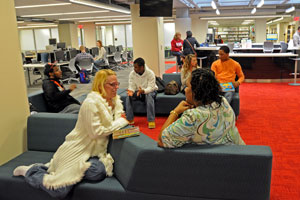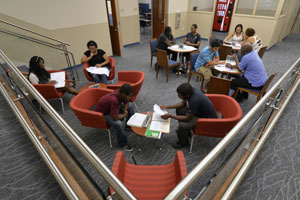COVID-19 Health & Safety Guidelines
Face Coverings & COVID-19 Vaccination
Vaccination
Proof of COVID-19 vaccination is no longer required for students, faculty, and staff. However, certain divisions, such as Allied Health & Nursing, may have specific vaccine/masking requirements. The College strongly recommends that all students, faculty, and staff be fully vaccinated.
Mask-Optional
Masking is optional at all College locations. However, faculty have the option of requiring masks in their individual classrooms, labs, and offices. Students who refuse to wear a mask in a classroom/lab/office where required will be referred to the Student Conduct office. Mask expectations in individual offices of faculty and staff will be at the discretion of the host. Masks continue to be available in all classrooms/labs and facilities at all College locations.
Faculty, staff and students should respect the masking preferences of others when meeting in offices or smaller spaces.
Sanitizing & Cleaning Protocols
- All students and employees should wash hands often with soap and water for at least 20 seconds. Hand sanitizer stations are located throughout all College locations.
- The College will continue with the enhanced cleaning protocols to include, but not limited to, the cleaning of classrooms, laboratories and computer labs.
Respiratory Virus Guidance
DCCC follows the Centers for Disease Control and Prevention (CDC) recommended guidance for how people can protect themselves and their communities from respiratory viruses, including COVID-19.
For more information visit the CDC website for Respiratory Virus Guidance | Respiratory Illnesses | CDC.
This guidance brings a unified approach to addressing risks from a range of common respiratory viral illnesses, such as COVID-19, flu, and RSV, which can cause significant health impacts and strain on hospitals and health care workers.
As part of the guidance, DCCC recommends our students and employees follow these recommendations on core prevention steps and strategies:
- Staying up to date with vaccination to protect people against serious illness, hospitalization, and death. This includes flu, COVID-19, and RSV if eligible.
- Practicing good hygiene by covering coughs and sneezes, washing, or sanitizing hands often, and cleaning frequently touched surfaces.
- Taking steps for cleaner air, such as bringing in more fresh outside air, purifying indoor air, or gathering outdoors.
When students and employees get sick with a respiratory virus, DCCC recommends that they stay home and away from others. For people with COVID-19 and influenza, treatment is available and can lessen symptoms and lower the risk of severe illness. As the guidance suggests, employees and students may return to normal activities when, for at least 24 hours, symptoms are improving overall, and if a fever was present, it has been gone without use of a fever-reducing medication.
Once people resume normal activities, they are encouraged to take additional prevention strategies for the next 5 days to curb disease spread, such as taking more steps for cleaner air, enhancing hygiene practices, wearing a well-fitting mask, keeping a distance from others, and/or getting tested for respiratory viruses. Enhanced precautions are especially important to protect those most at risk for severe illness, including those over 65 and people with weakened immune systems.
While every respiratory virus does not act the same, adopting a unified approach to limiting disease spread makes recommendations easier to follow and thus more likely to be adopted and does not rely on individuals to test for illness.
The updated guidance also includes specific sections with additional considerations for people who are at higher risk of severe illness from respiratory viruses, including people who are immunocompromised, people with disabilities, people who are or were recently pregnant, young children, and older adults.
Respiratory viruses remain a public health threat. DCCC will continue to adhere to and follow recommended guidance from the CDC, and ensure that our students, employees, and community has the information and tools to lower their risk or respiratory illness by protecting themselves, families, and communities.
Students and employees are required to direct all COVID-19 related questions and/or concerns to the Human Resources office at covid19@dccc.edu.
Monkeypox
Monkeypox is a rare, contagious disease caused by the same family of viruses that causes smallpox. Monkeypox symptoms are similar to those of smallpox, but milder and rarely fatal.
To learn about the symptoms, spread, prevention, treatment, vaccination and more about monkeypox, you may visit the following websites.
- Centers for Disease Control & Prevention
- Delaware County Health Department
- Chester County Health Department
Mental Health & Well-Being
- The College has resources available to help support mental and emotional well-being. Students in need of assistance should contact the Career and Counseling Center. Employees in need of assistance should contact the College’s Employee Assistance Program.
- The College values the importance of student engagement and participation in clubs, activities, athletics, wellness programs, etc. Please encourage students to connect with the Offices of Campus Life and/or Wellness, Athletics, and Recreation to find out more about how to get involved and stay connected with the campus community.













